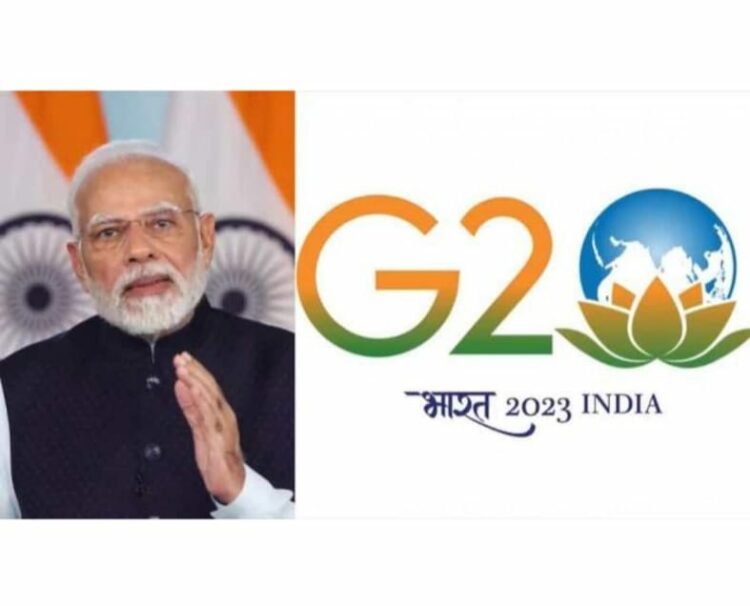New Delhi: It goes without saying that the primary driving force in today’s foreign policies across the globe is the promotion of international economic relations. Having said this, it also ought to be understood due to multiple forms of geo-strategic challenges, even the G20 as an economic platform is soon forced to give more prominence to issues like war and health.
But it will be imperative to underline that G20, in effect, reflects the economic order of the contemporary setting. But it will never be a case to argue that G20 is an alternative to the United Nations. India took over the presidency of G20 in December 2022 and will host the Summit this year. India is a fast-growing economy with high rates of growth.
Let us look at the seven top economies in the world. While the United States tops the list, India ranks 5th with 7 per cent growth figures, and India is above the UK and France. The Chinese economy has faced challenges, and so has the American economy. Taking a closer view of the Indian economy, it may be pointed out that India needs the policy to boost manufacturing and exports. The endeavour is to achieve a five trillion dollar economy.
Experts say at least 35 to 40 per cent of the same should come from global trade.
Of course, there are two components to pursuing global economic relationships. One is multi-platforms, and the mission is to get greater market access. India has pledged to articulate the concerns of the global South. The critical layer is more crucial, that is, bilateral economic relationships. Things are complex in this sector.
India sees a lot of potential for good economic relationships with some countries, but the scope of an excellent political relationship is less. On the other hand, notwithstanding fantastic political connections, the economic ties have remained weak. Analysts would readily say that economic diplomacy is the flavour of the season. Still, it is also true that economic diplomacy must be premised on a win-win formula both at multi-platforms such as WTO and while pushing strong economic bilateral relationships. On this backdrop, India’s foreign policy must be geared toward seeking trade openings.
These essentially drive the debate to the significance of engaging more openly with a global economy to foster economic growth. Suresh Prabhu, as Union Commerce Minister in Modi-1.0 Govt, had said that in the new world order, diplomacy would increasingly be driven by “economic considerations”. Now at the next stage comes the use of technology in economic diplomacy. But before dwelling further on these, there is a need to understand that the principal move behind economic diplomacy should be to garner suitable investments. This helps boost domestic growth and infrastructure and, in turn, brings in more revenues and investments.
Technology in diplomacy can scale up the promotion of exports. Here the results can be good in more ways than one.
A vast pool of people will be created from two or more countries who get to know each other through multiple economic activities. In such situations, we can find other things develop, like education, culture and soft powers in a general sense.
There are essential features which came up for deliberations between BJP office bearers and Prime Minister Narendra Modi. It was stated that in ‘domestic investment and manufacturing’, India’s performance has been relatively better than the west. Post the pandemic crisis, while India displayed strong resilience, a few neighbouring countries, Pakistan, Sri Lanka, and Bangladesh, faced more significant challenges.
Morgan Stanley, the well-known financial services company, says, “India will surpass Japan and Germany to emerge as the third largest economy by 2027”. Moreover, analysts agree that India plans to take on China as South Asia’s favourite lender; in this endeavour, the private sector is also contributing.
While India’s state-owned companies have long operated in neighbouring countries, analysts say Modi’s government has realised it needs more corporate economic firepower than it can provide.
India has used a mixture of policy and diplomacy, they say, to encourage private corporate champions to pursue deals that offer commercial opportunities in fast-growing markets and help advance New Delhi’s interests, says BJP national vice president M Chuba Ao quoting global market watchers.
These should lead us to the debate about the inherent strengths of the Indian economy.
G20 Summit will also provide a global platform to offer India as a growing democracy which pitches for a clean economy. The GST was a rightful reform trajectory. Over the last few years, the Modi government has focused on the fight against corruption. The Black Money Imposition Tax Act 2015 was one such step. Demonetisation in 2016 also played its part. Corruption is a menace, and thus, fighting it by catching the bull by the horns can contribute to the growth of the economy.
The G20 mega event is also an occasion to nurture dreams. India’s repositioning in the comity of nations starting 2023-24 and its transitions into an era between 75 years and the 100th year; will be a transition that will swing the entire GDP of the world. Let us thus focus on shared prosperity, as they put it.



















Comments